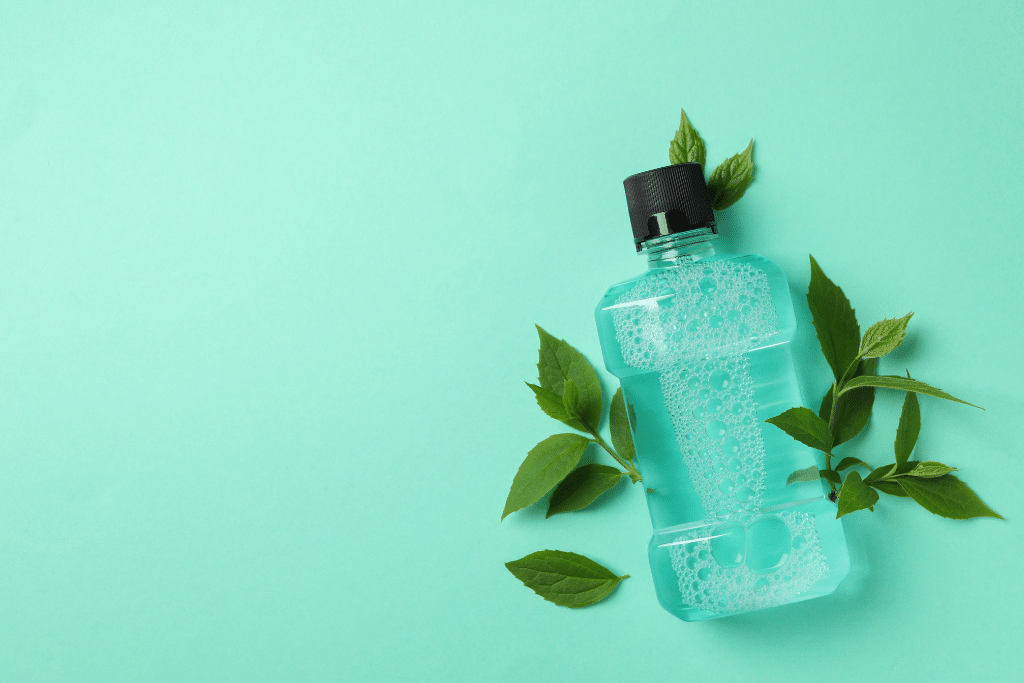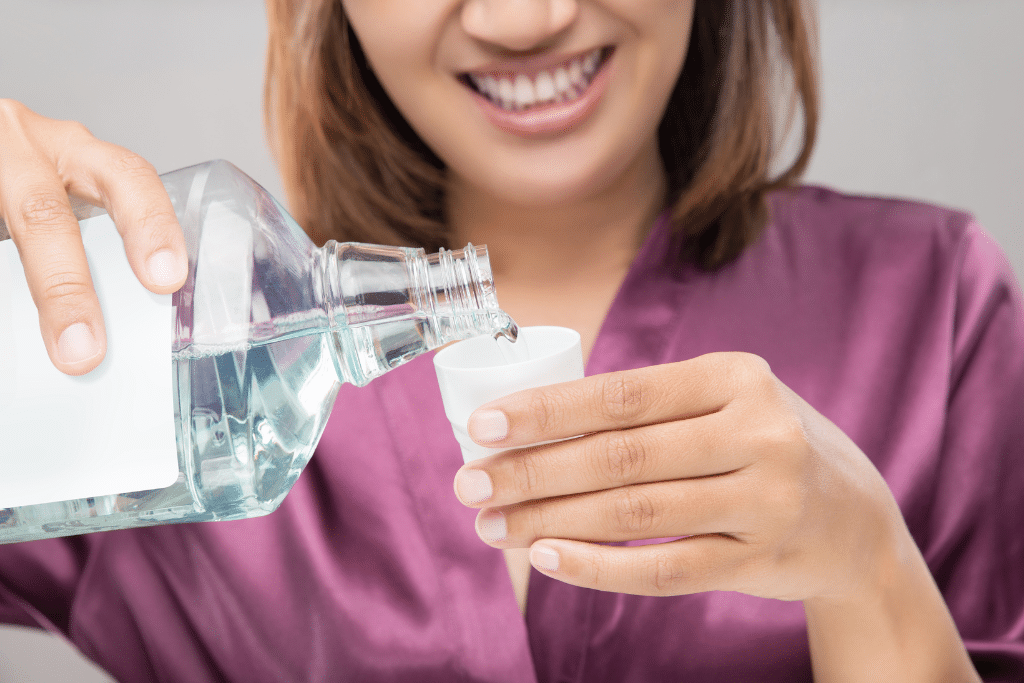An effective oral care routine can include mouthwash as a valuable addition, but when is the best time to use it? Let’s look at what mouthwash does when you should use it and how it can benefit your overall dental health.
What is Mouthwash?
Mouthwash, or an oral rinse, is a liquid solution that can enhance your daily dental routine. It helps to kill bacteria, freshen your breath, and prevent decay and gum disease. Different oral rinses are available, from cosmetic versions that freshen breath to therapeutic ones that offer added protection for your teeth and gums.
Is Mouthwash Necessary for Good Oral Health?
Whilst mouthwash is optional, it can help prevent tooth decay and reduce gum inflammation by reaching areas your toothbrush and floss might miss. Our dentists recommend using it twice daily 30 minutes after brushing and flossing, but consult your dentist for advice.
When to Use Mouthwash?
The best time to use mouthwash is after brushing and flossing, as it acts as a final rinse to remove any lingering food particles and bacteria. However, using an oral rinse immediately after brushing is not recommended, as it can wash away the fluoride from the toothpaste and diminish its protective effects. It is essential to wait at least thirty minutes after brushing to allow the concentrated fluoride to remain on the teeth and enhance oral fitness. Using mouthwash twice daily—once in the morning and once at night—can promote healthier teeth and gums. If you can’t brush immediately after a meal, mouthwash can be especially beneficial, as it neutralises acids and clears out food debris.
Alcohol mouthwashes are an excellent option for dryness. They help keep the mouth moist and reduce the risk of cavities and gum disease.
Should I use mouthwash before bed?
Yes, incorporating an oral care routine mouthwash before bed is a good practice. It helps reduce bacteria and plaque buildup that occurs overnight. Mouthwash can also provide fresh breath and additional protection for your teeth and gums while you sleep, mainly if you use a fluoride-based rinse that strengthens enamel.
Should I rinse with water after mouthwash?
Rinsing with water after using oral rinses depends on the type of mouthwash. If you’re using fluoride, it’s generally recommended not to rinse with water afterwards, as this allows the fluoride to continue working on your teeth. However, if your mouthwash is alcohol-based or antiseptic, rinsing with water afterwards is usually not necessary but won’t negate its effects. Always check the product instructions for the best results.
Why Oral Hygiene Routine Matters
Maintaining good oral health is essential for keeping gums and teeth healthy and preventing tooth decay and gum disease. Using fluoride toothpaste is crucial as it helps strengthen tooth enamel and should be used without rinsing immediately afterwards to maximise its benefits. While brushing and flossing are essential for removing plaque and food debris, mouthwash can help reach areas that might be missed. Many mouthwash products also contain fluoride, which helps strengthen tooth enamel and reduce the risk of cavities.
Incorporating mouthwash into your routine helps eliminate harmful bacteria that cause bad breath and other oral problems. It’s an extra step to maintain a healthy balance of bacteria in your mouth and protect your teeth.
Is Mouthwash a Substitute for Brushing?
While mouthwash is a valuable tool, it should never replace brushing. Brushing with fluoride toothpaste removes plaque and food from the surface of your teeth, applies fluoride to strengthen enamel, and stimulates the gums to prevent gum disease. Mouthwash complements brushing by reducing bacteria and freshening breath but doesn’t clean or stimulate gums as brushing does. Both are essential for complete oral fitness.
Choosing the Right Mouthwash
Therapeutic oral rinses contain ingredients that help reduce plaque, fight cavities, and combat bad breath. Cosmetic mouthwashes, on the other hand, mask bad breath. If you have sensitive gums or dry mouth, opt for an alcohol-free version, as alcohol can be harsh on delicate oral tissue. Fluoride mouthwashes are also great for strengthening enamel.
What are the Benefits of Using Mouthwash?
Mouthwash provides several key benefits:
- Reduces harmful bacteria in the mouth.
- Freshens breath.
- Reaches areas that brushing and flossing may miss.
- Fluoride mouthwash strengthens enamel and helps prevent cavities.
- Alcohol-free versions help relieve dry mouth symptoms.
- Drink fluoridated water to support overall dental health and prevent cavities.
What are the Potential Drawbacks of Mouthwash?
Like most products, mouthwash can have some disadvantages:
- Alcohol-based mouthwashes can cause dry mouth or irritation, especially for those with sensitive gums.
- Mouthwash can temporarily mask severe dental issues, like gum disease or tooth decay.
- Certain mouthwashes may stain teeth with long-term use.
- Some users may experience a temporary change in taste.
- Overuse can disrupt the natural balance of bacteria in the mouth, leading to other oral health issues.
Always follow the instructions on your mouthwash and speak to your dentist if you have concerns. Incorporating mouthwash into your oral care routine, including brushing and flossing, is essential for optimal oral health.
Is Water a Good Alternative?
While rinsing with water can help remove food particles and bacteria, it doesn’t offer the same benefits as mouthwash. Mouthwash contains antibacterial agents that reduce bacteria, fluoride to strengthen enamel, and therapeutic ingredients to address specific oral health concerns. Water is useful for rinsing after meals, but it’s best to use mouthwash with your brushing and flossing routine for optimal oral health. Additionally, avoid frequent snacking as part of a balanced diet to maintain good oral health and prevent dental issues.
Oral Health: Mouthwash Helps, But Don’t Skip Dentist Visits at Fulham Road Dental
While mouthwash can enhance oral health, seeing your dentist regularly for professional cleanings and advice is essential. At Fulham Road Dental, our skilled dental hygienists provide thorough cleanings and expert guidance, helping you maintain healthy teeth. Incorporating mouthwash into your daily routine can offer additional protection, but professional care is essential to ensure your dental health is in top shape. A comprehensive oral care routine, including brushing, flossing, and mouthwash, is crucial for optimal oral health.


